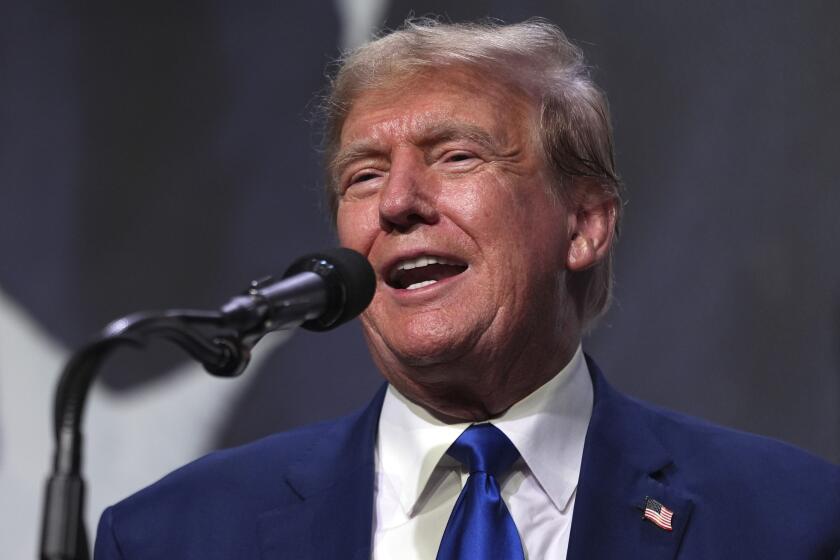Brazil clown will leave big shoes to fill in Congress
BRASILIA, Brazil — Francisco Everardo Oliveira Silva never expected to actually be elected to Brazil’s Congress. When he ran for a seat in 2010, he used his clown name, Tiririca, and wore a tiny orange hat and a blond wig in his campaign TV spots. Between singing and dancing, he made some very odd campaign promises.
“What does a federal deputy do? I don’t really know. But vote for me, and I’ll tell you!”
“I promise to help those in need,” he said, in a nod to political corruption. “Especially my own family.”
The clips were a hit. Silva received more votes than any other congressional candidate and was elected to Brazil’s equivalent of the House of Representatives. He was boosted, analysts say, both by his comedic popularity and by a deep anti-political streak that exists in Brazil and many other democratic nations, similar to that which led to the election of comedian Beppe Grillo this year in Italy.
Initially, Silva’s election annoyed Brazil’s political establishment no end. But when he arrived in Brasilia, he did something few expected. He took his job very seriously.
“In my life I have never slacked off at anything,” says Silva, 47, sporting bleached blond hair and beard, orange tie and matching orange shoes. “If I had, I never would have succeeded as a comic artist. I didn’t come here to clown around.”
Yet after only three years, Silva has thrown in the towel, saying he is deeply frustrated by government gridlock and bureaucracy. He plans to quit rather than seek a second term in next year’s election.
“You can’t get anything done in here,” he says. “Nothing gets done. I’ll get more done as a clown.”
For Silva, performing is in his blood. He was born into a traveling circus family and took to the stage at age 8. His parents taught him the ropes for his various acts: trapeze artist, master of “deadly drops,” and clown. He never took to his mother’s preferred art form: fire-breathing.
His family traveled so much that he fell through the cracks of the country’s public schooling and government healthcare systems, which require a fixed address. Decades later, he barely passed a test to prove he was literate before entering Congress.
As an adult, his live shows, comedy albums, and eventual TV appearances earned him a bit of fame around the country, though until recently, no rich or powerful people would acknowledge liking him, he says.
Once ensconced in Brasilia, the capital, he set out to win passage of legislation that would allow children whose families move frequently to receive schooling and healthcare. In so doing, he became one of the few lawmakers to attend every legislative session, winning a Best Congressman award in the process.
But his attitude has changed.
“We work so hard, every single day, and nothing happens,” he says.
In the last decade, Brazil has enjoyed economic growth and an increasingly central place on the world stage. Silva is a member of a complex coalition that supports the nation’s popular president, Dilma Rousseff, whose party has won three consecutive elections.
But the economy is stagnating, with legislative gridlock a major barrier in implementing tax and labor law reforms.
“You do have a reasonable pace of legislative production in Brazil. [But] the big, visible reforms like constitutional amendments, tax reform and political reform have been in Congress for 10 to 20 years. But the nitty-gritty stuff gets passed,” says Joao Augusto de Castro Neves, a political analyst at the Eurasia Group in Washington. “In any democracy you have two steps forward and one step back. Sometimes two forward and three back.”
Moreover, Brazilian politicians routinely land in corruption scandals. Since Rousseff took office in 2011, nine members of her Cabinet have been forced to resign under suspicion of corruption, and 25 other high-level politicians have been convicted of participating in a vote-buying scandal.
“People look at me, and they see a regular guy,” Silva says. “They look at all these other politicians and they just see crooks.”
Silva is now a rare exception, something of a celebrity in the halls of Brasilia’s modernist capital buildings. Everywhere he walks, fans and politicians mob him for autographs and photos, to the point that it takes him almost an hour to get from the voting floor to his office.
He says he has never seen corruption up close, but reads about it in the papers. What he has seen is crippling bureaucracy.
“Every once in a while these kinds of candidates are very successful,” Castro Neves says. “It’s because people are basically tired of the system.”
Silva has no idea what advice he’d give to Grillo, the Italian comedian whose successful campaign had a strong online presence.
“I don’t know what he’s going to do,” Silva says. “I wouldn’t come at the structure so strong trying to bring it down like that.”
There is still the chance his legislative effort to help children without fixed addresses will be debated by the next Congress. But he is not convinced by arguments that Congress is doing the best it can.
“In this session of Congress, out of 513 members, only seven of us have attended every session,” he says. “Seven! That’s absurd! Absurd! And I’m supposed to be the clown.”
Bevins is a special correspondent.
More to Read
Start your day right
Sign up for Essential California for news, features and recommendations from the L.A. Times and beyond in your inbox six days a week.
You may occasionally receive promotional content from the Los Angeles Times.






